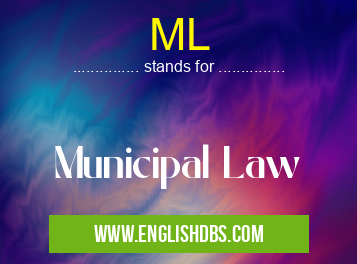What does ML mean in LAW & LEGAL
ML stands for Municipal Law, which is a branch of law that deals with the legal aspects of local government. Municipal law encompasses a wide range of topics, including zoning, land use, building codes, public works, and taxation.

ML meaning in Law & Legal in Governmental
ML mostly used in an acronym Law & Legal in Category Governmental that means Municipal Law
Shorthand: ML,
Full Form: Municipal Law
For more information of "Municipal Law", see the section below.
Scope of Municipal Law
Municipal law typically applies to cities, towns, and villages. It governs the powers and responsibilities of local governments, as well as the rights and obligations of citizens within their jurisdictions. Municipal law is created by local legislative bodies, such as city councils and town boards.
Key Features of Municipal Law
- Local Focus: Municipal law is primarily concerned with matters that affect the local community.
- Regulatory Nature: Municipal law often involves the regulation of activities within a local government's jurisdiction, such as building construction and business operations.
- Enforcement: Local governments are responsible for enforcing municipal laws through police, code enforcement officers, and other officials.
- Citizen Participation: Citizens have the right to participate in the creation and enforcement of municipal law through public hearings, elections, and other channels.
Essential Questions and Answers on Municipal Law in "GOVERNMENTAL»LAW"
What is Municipal Law?
Municipal Law is a branch of law that governs local government entities, such as cities, towns, and counties. It includes laws and regulations that govern the structure, powers, and responsibilities of these local governments.
What are the main categories of Municipal Law?
Municipal Law typically covers a wide range of topics, including:
- Land Use and Zoning: Laws governing the use and development of land within a municipality.
- Building Codes: Regulations that set standards for the construction and safety of buildings.
- Taxation: Laws that authorize local governments to levy taxes and other fees.
- Public Works: Laws that govern the provision of essential services such as water, sewer, and garbage collection.
- Public Safety: Laws that regulate police and fire protection services.
Who enforces Municipal Law?
Municipal Law is primarily enforced by local government officials, such as city council members, mayors, and police officers. However, state and federal agencies may also have a role in enforcing certain municipal laws.
How can I find out more about Municipal Law in my area?
To learn more about Municipal Law in your specific jurisdiction, you can:
- Visit the website of your local government: Many municipalities have websites that provide information about local laws and ordinances.
- Contact your local government clerk: The clerk's office can provide you with copies of municipal laws and ordinances.
- Consult an attorney: An attorney who specializes in Municipal Law can provide you with legal advice and representation.
Final Words: ML (Municipal Law) plays a vital role in the governance of local communities. It empowers local governments to provide essential services, regulate land use, and protect the rights of citizens. Understanding municipal law is important for both local officials and residents who wish to participate effectively in their communities.
ML also stands for: |
|
| All stands for ML |
